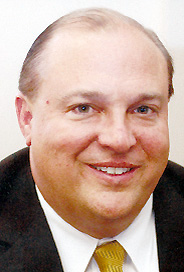

Tuesday, June 22, 2010
City, state wrangle as $3.5M in back taxes remains on books
By DAVID SKOLNICK
YOUNGSTOWN
A sign displayed at the Covelli Centre in Youngstown

Youngstown finance director David Bozanich
Mahoning County records show the city owes about $3.5 million in unpaid back property taxes on the Covelli Centre.
The city had sought tax-exempt status from the Ohio Department of Taxation in April 2006 for its indoor entertainment and sports arena.
But more than four years later, the state has yet to make a decision on granting that status to the Covelli Centre, known as the Chevrolet Centre when the city initially filed the paperwork.
Fourteen months is the typical processing time, said John Kohlstrand, the department’s communications director.
“It’s unfortunate it’s taken this long,” he said. “We recognize this isn’t a pleasant situation for Youngstown.”
Until the matter is resolved, the city isn’t liable for the back taxes, and the county hasn’t put a lien on the 29.2-acre parcel, said county Treasurer Lisa Antonini. That is standard procedure in cases like this, she said.
City Finance Director David Bozanich expects Youngstown to receive the tax-exempt status. It’s just a question of when, he said.
The Department of Taxation turned over hundreds of pages of documents related to Youngstown’s request to obtain tax-exempt status for the city-owned center to The Vindicator.
The last document in the file is a 60-plus-page letter sent May 28, 2008, from Bozanich to Matthew T. Hollis, an attorney examiner in the state department’s division of tax equalization.
Bozanich was responding to an April 4, 2008, letter sent by Hollis seeking additional information on nine issues that needed to be answered before the status could be granted.
Kohlstrand said to a Vindicator reporter: “Your inquiry has brought this to our attention. I expect this will get a close look here.”
The reasons for the delay, he said, include: “key staff losses” in the tax-exemption unit, the amount of cases the unit gets every year — about 4,500 to 5,000 — and this case being “more complicated” than others.
The department is being reorganized to run more efficiently and have more employees doing this work with the goal to reduce the average typical processing time from 14 months to about seven months, Kohlstrand said.
A July 31, 2007, review of the city’s application for tax-exempt status by Rodney A. Robinson, tax commissioner agent in the department’s division of tax equalization, recommended approval.
But Shelley Wilson, the division’s executive administrator, wrote in a Sept. 24, 2007, internal memo that the decision was based on the wrong section of the Ohio Revised Code, and asked about the nine additional issues.
Hollis took six months to send a letter to the city — using language nearly identical to what Wilson wrote in her memo — seeking that additional information.
The law cited by Wilson in her memo states that public recreational facilities owned by political subdivisions are exempt from property taxes if they’re “not occupied and used for more than seven days in any calendar month by any private entity for profit or for more than a total of 15 days in a calendar month by all such private entities for profit.”
There’s been a for-profit hockey team at the center since it opened in October 2005 that used the facility for those time periods.
“This one is more complicated than others,” Kohlstrand said.
Bozanich agreed that “there are some complicated issues that need to be reviewed. But there are a lot of facilities like this that have been granted exemptions.” He cited facilities in Toledo and Akron.